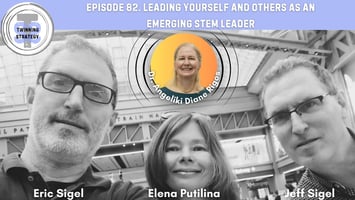In this week's episode of the Twinning Strategy Podcast, Sally Foley Lewis, a seasoned leadership...
Unlocking Leadership Effectiveness: Insights from Dr. Kim Allen
ChatGPT with the writing credit again for this week (this might become a habit):
In this week's episode of the "Twinning Strategy" podcast the team welcomed Dr. Kim Allen, an executive coach, leadership advisor, and author of two impactful books, "reLead" and "reEngage." This lively discussion centered around modern leadership challenges and the essential qualities that define an effective leader in today's dynamic environment.
Key Themes from the Episode:
1. **The Importance of Leadership Effectiveness**:
Dr. Allen highlighted that mere titles do not equate to effective leadership. She emphasized the word "effectiveness" as crucial, noting that even among well-trained leaders, many fail to excel. This often leads to a revolving door in corporate leadership, where leaders frequently move in and out of roles due to a lack of effectiveness.
2. **Training vs. Implementation**:
A significant point made during the conversation was the disconnect between leadership training and practical implementation. Dr. Allen reflected on her experience witnessing leaders complete training programs without truly applying what they learned. She pointed out that organizations must ensure leaders are not only equipped with knowledge but also given guidance on how to implement that knowledge effectively.
3. **Personalized Leadership Approaches**:
The podcast discussed the importance of recognizing that each team member is unique with distinct learning and communication styles. Leaders must actively engage with their teams to understand these differences and tailor their leadership approaches accordingly. By doing so, they create a more inclusive and motivated environment where team members feel valued.
4. **The Role of Soft Skills**:
Dr. Allen and the hosts agreed that soft skills—often viewed as secondary—are, in fact, vital to effective leadership. Communication, self-awareness, and the ability to connect with others are indispensable traits for leaders aiming to foster a positive workplace culture.
5. **Navigating the New Normal of Leadership**:
Reflecting on the impact of the COVID-19 pandemic, Dr. Allen pointed out how remote work has altered traditional leadership dynamics. Leaders must continue to uphold professionalism and accountability, even in virtual settings, and should not shy away from setting clear expectations.
6. **Creating Engagement**:
A memorable metaphor introduced by Dr. Allen was that leaders need to "make the horse thirsty." This implies that leaders should cultivate a desire among their teams to engage and contribute actively. By fostering an environment of involvement and interest, leaders can create a more dedicated and responsive workforce.
7. **Investing in Middle Management**:
The conversation concluded with a call to action for organizations to invest in their middle managers. Businesses need to focus on developing these leaders, as they are the backbone of the organization and hold the potential to transform leadership effectiveness.
Final Takeaways:
Dr. Kim Allen’s insights serve as a reminder that leadership is an ongoing journey of growth and adaptation. Effective leadership is not about authority; it's about understanding and relating to the people you lead. As organizations navigate the evolving work landscape, leaders must commit to developing their skills and learning from both successes and failures.
For anyone looking to enhance their leadership abilities or support the development of others, Kim’s books are a valuable resource—offering practical advice and frameworks to foster effective and engaged leadership.
**Connect with Dr. Kim Allen and explore her books at [The Dr. Kim Approach](http://www.thedrkimapproach.com)**.
Incorporating these lessons into our daily practices not only contributes to personal growth but also creates lasting positive changes within our organizations. Leadership, after all, is about making an impact and empowering others to thrive.



